In this episode, we travel to a future where a tech mogul feeds a machine learning system all the religious texts he can find, and asks it to generate a “super religion.”
Buckle up because this is a long episode! But it’s fun, I promise.
For the intro of this episode I worked with Janelle Shane to actually train a machine learning algorithm on a big chunk of religious texts that I assembled, and spit something back out. The specifics of the texts and the machine learning algorithm come with a handful of caveats and notes, which you can find at the bottom of this post. Janelle has done of ton of really funny, interesting things with machine learning algorithms that you can find here.
To analyze the text that this algorithm generated, and talk about the limitations of this kind of project, I spoke with a big group of people from a variety of backgrounds:
- Linda Griggs is an Episcopal priest and an assisting priest at St. Martin’s Episcopal Church in Providence Rhode Island.
- Lauren O’Neal and Niko Bakulich are the hosts of a podcast called Sunday School Dropouts, whose tagline is: “an ex-Christian (Lauren) and a non-believing sort of Jew (Niko) read all the way through the Bible for the first time.”
- Elias Muhanna is the Manning Assistant Professor of Comparative Literature at Brown University, and director of the Digital Islamic Humanities Project.
- Beth Duckles is a sociologist (who you heard last episode talking about peanut allergies).
- Carol Edelman Warrior is an Assistant Professor of English at Cornell’s American Indian and Indigenous Studies Program. She is also enrolled with the Ninilchik Village Tribe (Dena’ina Athabascan / Alutiiq), and is also of A’aninin (Gros Ventre) descent.
- Mark Harris is a journalist who writes about technology, science and business for places like WIRED, The Guardian and IEEE Spectrum. He wrote a great piece about Anthony Levandowski’s new religion of artificial intelligence called Way of the Future.
Further Reading:
- Sunday School Dropouts: Robobible
- Inside the First Church of Artificial Intelligence
- God is a Bot and Anthony Levandowski is His Messenger
- Way of the Future
- Nine Billion Names by Arthur C. Clarke
- Dataism + Machine Learning = New Religion
- Machine Learning May Help Determine When the Old Testament Was Written
- Indigenous Writers of Speculative Fiction
- Aztec Philosophy: Understanding a World in Motion
- The Space NDN’s Star Map
- Borrowed Power: Essays on Cultural Appropriation
Caveats on the Algorithm:
There are approximately a thousand caveats to this machine learning project, and here are some of them: To train the algorithm, I compiled a set of source texts. This is by no means a full sampling of religious texts, nor is it in any way scientific. I am not an expert on religions in any way. I made no effort to balance the source texts by popularity of the religion or anything like that. The sampling is heavily biased by which texts I could find online for free in a format I could use. I had to exclude a few texts that I wanted to have in there because I couldn’t find versions that did not heavily include non-English sections. (The machine learning algorithm would have been totally thrown off by random bits of Italian or French or Mandarin, and I didn’t have time to manually go through thousands of pages and strip out the non-English text). I also had to skip a few texts that were so full of footnotes that the spiritual text itself was hard to pull out.
I did make a conscious effort to balance out the Abrahamic religions, while also trying to avoid accounts written by white colonizers about traditions they had just “discovered” in their travels. I tried my best to include mostly descriptions and texts written by folks who actually belonged to the traditions themselves, or at least were respected translators. That said, there are huge holes in this list.
Here is the full list of sources and links to where I found them:
- King James Bible: http://www.gutenberg.org/cache/epub/10/pg10.txt
- Yusuf Ali’s English translation of the Quran (1934): http://www.sacred-texts.com/isl/yaq/index.htm
- The Jewish Publication Society of America 1917 Tanakh: https://www.jewishvirtuallibrary.org/the-tanakh-full-text
- Book of Mormon: https://www.archive.org/stream/thebookofmormon00017gut/mormon13.txt
- Gita Society http://www.sacred-texts.com/hin/gita/agsgita.htm
- Jaina Sutras translated by Hermann Jacobi http://www.sacred-texts.com/jai/sbe22/index.htm
- The Kojiki: http://www.sacred-texts.com/shi/kojiki.htm
- Guru Granth Sahib: http://www.sacred-texts.com/skh/granth/index.htm
- Rig Veda: http://www.sanskritweb.net/rigveda/griffith.pdf
- The Analects of Confucius: http://www.wright-house.com/religions/confucius/Analects.html
- The Complete Works Of Chuang Tzu, Translated by Burton Watson https://terebess.hu/english/chuangtzu.html
- The Tao Te Ching by Lao Tzu: http://web.archive.org/web/20110106080428/http://home.pages.at/onkellotus/TTK/English_Henricks_TTK.html
- The Kitáb-i-Íqán: http://reference.bahai.org/en/t/b/KI/index.html
- Holy Piby: http://www.sacred-texts.com/afr/piby/index.htm
- Australian Sacred Legends: http://www.sacred-texts.com/aus/alt/index.htm
- The Cloud Upon the Sanctuary: http://www.sacred-texts.com/eso/cuts/index.htm
- Dianetics: https://stss.nl/stss-materials/English/Books/EN_BO_Dianetics_The_Modern_Science_of_Mental_Health_DMSMH.pdf
- Hausa Folk Lore by Maalam Shaihua, translated by R. Sutherland Rattray: http://www.sacred-texts.com/afr/hausa/index.htm
- Maori Myths and Ledgends: http://eng.mataurangamaori.tki.org.nz/Support-materials/Te-Reo-Maori/Maori-Myths-Legends-and-Contemporary-Stories
- Sioux Legends by Zitkala-Sa: http://www.sacred-texts.com/nam/oil.htm
- Truth of a Hopi: http://www.sacred-texts.com/nam/hopi/toah/index.htm
- The Mesnevi and the Acts of the Adepts translated by James W. Redhouse http://www.sacred-texts.com/isl/mes/index.htm
- Hávamál – The Sayings of Hár: http://www.voluspa.org/havamal.htm
- Popol Vuh: https://archive.org/stream/PopolVuh/1019117-The-Popol-Vuh-English_djvu.txt
- Gardnerian Book of Shadows (Wiccan): http://www.whyte-witch.com/sacredtext.pdf
- Joyous Cosmology: http://www.holybooks.com/joyous-cosmology-alan-watts/
- Buckland’s Complete Book of Witchcraft: https://cdn.preterhuman.net/texts/religion.occult.new_age/Magick/Complete%20Book%20Of%20Witchcraft.pdf
- The Second Battle of Mag Tuired (Celtic): http://www.sacred-texts.com/neu/cmt/cmteng.htm
- The Cattle Raid of Cualnge: http://www.sacred-texts.com/neu/celt/crc/index.htm
- The Celtic Dragon Myth: http://www.sacred-texts.com/neu/celt/cdm/index.htm
- ‘Raja Yoga, or Mental Development: http://www.sacred-texts.com/eso/ryo/index.htm
- The Kalevala: http://www.sacred-texts.com/neu/kveng/index.htm
- Yukara epos of the Ainus by Kamuy-Yukara: http://www.sacred-texts.com/shi/ainu/yukara.htm
- Yana Texts: http://www.sacred-texts.com/nam/ca/yat/index.htm
- The General Book of the Tarot: http://www.sacred-texts.com/tarot/gbt/index.htm
- A Dweller on Two Planets: http://www.sacred-texts.com/atl/dtp/index.htm
- Fifty-one Tales: http://www.sacred-texts.com/neu/dun/fotd/index.htm
- The Kybalion: http://www.sacred-texts.com/eso/kyb/index.htm
You can find the full plaintext document we fed the algorithm here. I tried to strip out tables of contents, introductions, indexes and as much of the other non-spiritual text as I could (special thanks to Robert Brenner for his help with that). That said, despite his valiant efforts, some of it almost certainly creeped in.
You can read all about the algorithm Janelle used to generate the text on her blog.
In short: don’t take the output of this algorithm too seriously. It was a fun and interesting project, but it is not a new religion nor is it meant to be comprehensive or representative. All that said, here’s the algorithmically generated holy text:
The perfect guru is the giver of the lord, and the perfect pool of the lord. The deluded of the lord god is the doer, the doer is the lord, and the doer is the lord’s darshan.
And the lord shall be the son of Eliphaz in the land of the dumb of the ladies of the skin of the lamb of the tabernacle of the tini of the lord.
The camel (might), in this day, face the lord’s light. He is never precious (to the camel).
The gurmukh speaks: I bless the glorious praises of the lord of the lord of the land of the guru, the searcher of the lord of the holy treasuries within the one lord.
This is made the job of the chicken-hued, with the common world, (and) to the hand.
A nun met the universe of the unseen; in the world-halves will be the light of the water of heaven.
The chicken listed of the enmity is not a guest of the chicken of his people, as the universe had met the rain of that day.
O my beloved is contemplated in the rear of the lord, is bountee of the true guru, is the boat of the lord of the lord of the lord, and the lord of the lord of the holy of the lord of the lord is in the true guru.
The gurmukh speaks the glorious praises of the lord, har, har is the naam, the searcher of the lord himself understands the body of the guru, the naam. I am the glorious praises of the lord. The lord is the glorious praises of the guru, and the holy judge of the lord.
Whoever comes to be in the word of the lord shall be put in the middle of our content. And it is the sea, and the king. They were vexed grapes, and take them forth to the king of the lord, that the lord is the king of the children of the divine king.
His father dreamed up his clothes.
And he said unto them, and said unto him to put his clothes, and he was not cleaner than the magicness of the sword of the lamb, and he hath sworn by the sword of the sons of the lord of the ark of the service of Sinai and pain.
And he shall not be cleanness: but it shall be clean cloth, and saved the kine of cloth the heavenly male, and fifty more more to the gate of the gods and said unto them, and said the arts of the living of the children of the sword of the camp of the valley of the lamb of the world, for her substance of the sword of the lamb of heaven, and shall not be after in the day of all the cattledoves of the congregation of the sun.
and the lord said unto the lord shall be opened the clothing of the lamb of the lord.
one who loves the grace of the naam, the name of the lord.
one who loves the grace of the lord’s name, the name of the lord.
one who loves the grace of the lord.
one who loves the lord, one is not found the naam.
you have met the lord
god offers goodness of the lord.
Amen.
Flash Forward is produced by me, Rose Eveleth. The intro music is by Asura and the outtro music is by Hussalonia. The voices from the future this episode were by Stephen Garande and Linda Griggs. Special thanks to Robert Brenner who helped me clean up the giant corpus of religious texts. The episode art is by Matt Lubchansky.
This episode is sponsored in part by:
- HAPPY! a new SYFY show featuring Christopher Meloni and Patton Oswalt. HAPPY! premieres December 6th at 10, 9 central, on SYFY.
If you want to suggest a future we should take on, send us a note on Twitter, Facebook or by email at info@flashforwardpod.com. We love hearing your ideas! And if you think you’ve spotted one of the little references I’ve hidden in the episode, email us there too. If you’re right, I’ll send you something cool.
And if you want to support the show, there are a few ways you can do that too! Head to www.flashforwardpod.com/support for more about how to give. But if that’s not in the cards for you, you can head to iTunes and leave us a nice review or just tell your friends about us. Those things really do help.
That’s all for this future, come back next time and we’ll travel to a new one.
▹▹▹▹▹▹▹▹▹▹▹▹▹▹▹▹▹▹▹▹▹▹▹▹▹▹▹▹▹▹▹▹▹▹▹▹▹▹▹▹▹▹▹▹▹▹▹▹▹▹▹▹▹▹▹▹▹▹▹▹▹▹▹▹▹▹
TRANSCRIPT
Rose: Hello and welcome to Flash Forward! I’m Rose and I’m your host. Flash Forward is a show about the future. Every episode we take on a specific possible… or not so possible future scenario. We always start with a little field trip to the future, to check out what’s going on, and then we teleport back to today to talk to experts about how that world we just heard might really go down. Got it? Great!
Before we go to the future this episode I want to tell you about a podcast you should go check out called Gastropod. Gastropod is a show about food history and science — basically all the weird and wonderful things you never knew about the stuff you put in your mouth every day. Did you know that the Mafia got its start in the citrus business? Do you want to hack your tastebuds? Gastropod has all that, plus coming up this season: How much of the olive oil on grocery store shelves is fake? Yeah apparently fake olive oil is a thing. I did not know that, but I’m excited about that episode. Find Gastropod and subscribe to it on Apple Podcasts, Stitcher, or wherever you get your podcasts
Okay, let’s go to the future!
This episode we’re starting in the year 2042.
Tech-mogul: Ladies and gentlemen, thank you for joining me for this inaugural service of the Church of Amalgamation. As many of you know, this has been a dream of mine for many years. You see, I was lost. I had financial success, sure. I had a family, yes. But I never felt… grounded. I never felt truly rooted to anything. I read all the books, I meditated, I tried to embody mindfullness. And yet I still, floated. For centuries humans have fought this feeling with religion. But religion always felt to me so fractured. So divided. A source of pain. One side here, fighting another side here. All trying to find the truth and yet, somehow on opposite sides.
And then one day it hit me. I could use my skills, my expertise, to really uncover something. I could gather up all the books, all the texts, all the stories and myths and fables and rules and rituals of the whole world. And I could make them one. I could HARNESS the power of my supercomputers, my algorithms, and find the common ground. The underlying spirit. The one, true light.
It took years. I traveled the world. I scoured libraries across the globe for every last scrap of spiritual text I could find. Millions and millions of pages. And I set my computer on it, on a path of its own I guess. For a year it read and learned and read and learned again until it was ready.
And now today, it’s ready for you. The true light. The deepest of lessons. A super religion, if you will. I’m so excited to share it with you.
With that, let us hear from the holy text.
SERMON
Priest: The perfect guru is the giver of the lord, and the perfect pool of the lord. The deluded of the lord god is the doer, the doer is the lord, and the doer is the lord’s darshan.
And the lord shall be the son of Eliphaz in the land of the dumb of the ladies of the skin of the lamb of the tabernacle of the tini of the lord.
The camel (might), in this day, face the lord’s light. He is never precious (to the camel).
The gurmukh speaks: I bless the glorious praises of the lord of the lord of the land of the guru, the searcher of the lord of the holy treasuries within the one lord.
This is made the job of the chicken-hued, with the common world, (and) to the hand.
A nun met the universe of the unseen; in the world-halves will be the light of the water of heaven.
The chicken listed of the enmity is not a guest of the chicken of his people, as the universe had met the rain of that day.
O my beloved is contemplated in the rear of the lord, is bountee of the true guru, is the boat of the lord of the lord of the lord, and the lord of the lord of the holy of the lord of the lord is in the true guru.
The gurmukh speaks the glorious praises of the lord, har, har is the naam, the searcher of the lord himself understands the body of the guru, the naam. I am the glorious praises of the lord. The lord is the glorious praises of the guru, and the holy judge of the lord.
Whoever comes to be in the word of the lord shall be put in the middle of our content. And it is the sea, and the king. They were vexed grapes, and take them forth to the king of the lord, that the lord is the king of the children of the divine king.
His father dreamed up his clothes.
And he said unto them, and said unto him to put his clothes, and he was not cleaner than the magicness of the sword of the lamb, and he hath sworn by the sword of the sons of the lord of the ark of the service of Sinai and pain.
And he shall not be cleanness: but it shall be clean cloth, and saved the kine of cloth the heavenly male, and fifty more more to the gate of the gods and said unto them, and said the arts of the living of the children of the sword of the camp of the valley of the lamb of the world, for her substance of the sword of the lamb of heaven, and shall not be after in the day of all the cattledoves of the congregation of the sun.
and the lord said unto the lord shall be opened the clothing of the lamb of the lord.
one who loves the grace of the naam, the name of the lord.
one who loves the grace of the lord’s name, the name of the lord.
one who loves the grace of the lord.
one who loves the lord, one is not found the naam.
you have met the lord
god offers goodness of the lord.
Amen.
>>>>
Rose: So, in this future, a tech mogul has created a religion by feeding all the world’s religious texts into a machine learning algorithm to generate the ultimate religion.
And the scripture that you just heard in the intro actually was generated by a machine learning algorithm. I gathered up about five million words of spiritual texts that I could find on the internet, and enlisted the help of a machine learning master.
Janelle Shane: My name is Janell Shane and I train neural networks to write humor in my spare time.
Rose: You might be familiar with Janelle’s work with machine learning algorithms from her other projects. She has used neural networks to generate Halloween costumes, paint colors, craft beer names and more.
Janelle: And what a neural network is, is it’s a type of computer program is kind of weird compared to the kinds of computer programs that we’re used to dealing with. Most computer programs that we deal with every day, you know, they’re programmed to do a specific task. Every single instruction is in there and they’re following a list of instructions.
And with a neural network, the computer program itself is actually teaching itself to complete this task. You give it the goal. In my case, I’d give it some text and I say, “I want some more text like this.” And the neural network has to figure out what are all of the rules and correlations and so forth that make this text the text that it is. And not say a cookie recipe, or a finished grocery list
Rose: So for a neural network to work, you have to give it something to learn from. That something can be a giant list of fish names, Dungeons and Dragons spells, or, in this case, about five million words worth of religious texts.
Janelle: So the good news about the religious text database is that there’s a lot of data. Like hundreds of thousands of words, and this is good because the neural network is starting from scratch. It doesn’t even know if it’s going to be doing sentences, or if it’s going to be writing equations, or writing code or musical notation. So it’s got to figure out for itself, just from scratch even, that it’s got to use letters and spaces and maybe some punctuation and go from there. And so having lots of examples of how to spell words is really good for it.
Rose: Now, there are approximately 1,000 caveats to this machine learning generated religious text that you heard at the top. And we’re going to talk about those caveats a little bit later in the show because they’re actually a really important piece of this future, but first I want to look closely at the text itself.
Linda Griggs: As I was reading it, I thought about how I read scripture every Sunday, and I read it a lot aloud. And it really does lend itself to the general reading and emphasis and cadence, and it’s almost a little spooky how total nonsense can be made to sound liturgical, in a way.
Rose: This is Linda Griggs
Linda: I am an Episcopal priest, and an assisting priest at St. Martin’s Episcopal Church in Providence, Rhode Island
Rose: You might recognize her voice, she read the algorithmic scripture for the intro. And she wasn’t the only one who was impressed by how… convincingly religious… the text seemed.
Elias: If you had given this text to me, and not told me what it was, I think I would have guessed that it was some sort of religious text. That’s not just because there are no mentions of God, or the Lord, or gurus in it. I think even if I had read a verse like, “this is made the job of the chicken hued with the common world and to the hand.” You know, there’s no mention of God there, but if I had read that I would have thought that sounds like it is. It has a kind of aphoristic gnomic quality. And I wonder if I would have thought to myself, “this must have come from a religious tradition or some sort of a spiritual or philosophical tradition.”
My name is Elias Muhanna I’m an assistant professor of comparative literature at Brown University
Niko: I would say, first thing strikes me about it is the structure. The way it starts with some sort of declarative stuff, about almost educating us about the important aspects of this religion, before eventually transitioning into a little more of a narrative style, and then wrapping it up with a prayer at the end. Very believable structure, in terms of a short passage.
Lauren: I thought it might be exposing that maybe we’ve agreed upon a certain register or style that religious texts should have. So that when we translate them into modern english, no matter which text it is or who is doing the translating, they tend to converge on a single style.
And that made me think the AI might be actually pretty decent at replicating the style.
Niko: But don’t you start to get really good at noticing bots on Twitter and stuff.
Lauren: Me personally?No, I am an idiot.
I’m Lauren O’Neill. I’m a freelance writer and editor and also a co-host of the podcast Sunday School Dropouts
Niko: And I’m Nico Bacula. I’m the other co-host of The Sunday School Dopouts podcast.
Lauren: The tagline for our podcast is, “the podcast where an ex-Christian and a non-believing sort of Jew read all the way through the Bible for the first time. I’m the ex Christian
Niko: And I’m the non-believing sort of Jew.
Lauren: And we just discuss what we read.
Rose: The idea for this episode actually came from an episode of Sunday School Dropouts that Lauren and Niko did, where they fed the Bible into a very similar machine learning system and had it generate new biblical texts. Which got me thinking about how that idea could be expanded out beyond the Bible.
So let’s look at some specific bits of our algorithmic sermon, shall we?
One of the things that I really liked about this text is how many animals show up in it. You have chickens, camels, cattledoves, lambs.
Priest: The camel (might), in this day, face the lord’s light. He is never precious (to the camel).
The chicken listed of the enmity, is not a guest to the chicken of his people.
Linda: One of the things that I see when looking at the animals, is there is a psalm, I can’t remember which one, that says, “And there is that Leviathan which God has made for the sport of it.” It’s one of my favorite lines in all of Scripture. This is a God who takes joy in creation.
What happens if we see the Bible from the standpoint of all of creation and remember that there are verses about how the moon and the stars and the heavens declare the glory of God. And we do think seriously about the animals, and the emphasis on growing, and seeds, and and all different kinds of creatures, because they really are all the way through. You find them in Job, you find them in the Psalms, you find them just kind of everywhere.
Niko: And earlier before recording, I was asking Lauren whether she thought she was a camel or a chicken.
Lauren: See I think I’m a camel.So it says, “the camel might, in this day face the Lord’s light, he is never precious to the camel.” So I think the camel supposed to be an unbeliever, or just a puny mortal human who will have the chance to look at the Lord’s light and become a believer. But he might not. In which case, God will never be precious to him, because he’s a dumb camel. So, I’m an atheist so I think I’m a camel.
Niko I definitely thought of the camel as being a braver animal, because I think it takes bravery not to hold God as precious.
Lauren: As opposed to the chicken who’s just the stereotypical chicken – bawk bawk bawk – coward chicken.
Niko: I’m not totally sure. All we know, is that there’s a type of job that is the job of the chicken hued. With the common world, and to the hand. That doesn’t answer questions. But we also know that the chicken listed of the enmity is not a guest of the chicken of his people, as the universe had met the reign of that day.
Lauren: And what do you think about that.
Niko: Is is not a guest of the chicken of his people. It’s been tossed out maybe been cast out. What happened there.
Lauren: What happened this poor chicken? Let him in the coop please.
Niko: Regardless, I’d rather be a camel than a chicken. Based on this. If only because we can’t even tell what the chickens deal is.
Lauren: You’d rather take the devil you know, the camel you know.
Linda: But the camel is – and this is where you’re sort of seeing the camel as not just a dumb creature. Who has perhaps some volition. Who may or may not – is there a choice taking place. Facing the Lord’s light. Because – as I’m looking at this he, I guess, would be the Lord – never precious to the camel. That tells you that the camel seems to be somewhat aloof. And the idea of volition keeps coming up. This is this is more like a cat than a camel, in a way.
Rose: I think one of my favorite lines from the sermon is this one:
Priest: A nun met the universe of the unseen; in the world-halves will be the light of the water of heaven.
Linda: It’s such a beautiful picture. “A nun met the universe of the unseen” takes me outside of scripture and into the monastics, like Teresa of Avila and Julian of Norwich, and some of these women who were great thinkers and theologians and mystics of the church. You can almost see the world-halves almost revealing that which had been unseen. And really coming in touch with the divine. So that’s quite an adventure there, in that summons.
Rose: Linda gravitated towards this line the most.
Priest: His father dreamed up his clothes.
Linda: My first thought is Jacob and that coat that he gave to Joseph and the favortism that came from that. That resulted in the brothers and their jealousy and the adventures of Joseph that finally resulted in the entire family going to Egypt, and the whole start of the story of the people of God as a people of God. And it all came from, in a lot of ways, something as simple as a father’s relationship with his favorite son. So, yeah, I see that line as being just the seed of something really amazing and adventurous.
Rose: I also thought the little story about cleanliness and cleaning was really interesting.
Priest: And he said unto them, and said unto him to put his clothes, and he was not cleaner than the magicness of the sword of the lamb, and he hath sworn by the sword of the sons of the lord of the ark of the service of Sinai and pain.
And he shall not be cleanness: but it shall be clean cloth,
Niko: Likely, through many religions on earth, how you dress and clean yourself for both ritual and daily purposes is very tied into religion, which makes sense. Being clean is important, and God is important too.
Lauren: Friends, wash your hands before you eat.
Niko: Wash your hands before you pray. I’m not a student of comparative religion, but I’ll bet there’s stuff about cleanliness and about special clothes in almost every religion.
Lauren: I also am not a student of comparative religion, but thinking about the Bible; in the old testament, there is a lot of rules about cleanliness and clothes that are cast in a religious light, but they also just kind of seem like a society’s attempt at being healthy and just having rules about not spreading disease.
Carol: If I think about clean-ness; it kind of actually generates, for me a couple of really specific representations in indigenous religions about cleanness.
This is Carol Edelman Warrior
Carol: I’m an assistant professor at Cornell University in the Department of English. I’m an affiliate faculty in the American Indian and Indigenous Studies program here. I’m A’aniiih, Alutiiq, Dena’ina Athabascan and I’m an enrolled member of the Ninilchik village tribe in Alaska.
So one that a lot of indigenous religions or practices feature is the act of cleaning of a kind of energy through smudging or sweating. Like a sweat lodge. Cleanliness has to do with the type of energies or things you pick up in your world, or in your daily life. When you’re just walking down the street you can pick up something negative, kind of like a magnetic attraction. And so these practices like smudging or sweating can take those things off.
Rose: So that’s what the text is saying to these folks. But what about the concept as a whole? Could this religion even take off? Would anybody follow it? And what is this algorithmic concept missing? All that and more, when we come back.
Rose: So we walked through what this text might be saying. But what about this whole conceit in the first place — this idea that we could generate a new religion via algorithm.
Here is where we get into the caveats of the methodology. And these caveats don’t just apply to the small scale algorithm and text that Janelle and I assembled for the episode. They also apply more broadly to this entire future concept.
So first we have to talk about assembling the source text. For our little experiment, I only fed the system a tiny subset of information relative to how many religions there are out there. You can find links to all the source texts that I used in the show notes.
One of the things I thought a lot about while compiling that list, was making sure that the end result wasn’t totally dominated by the Abrahamic religions, so Judaism, Christianity and Islam. To do that, I had to make sure I balanced out those books with others. I found a pretty decent supply of texts from what I’ll call Asian traditions: Hinduism, Jainism, Sikhism, Buddhism, Confucianism, Shintoism, that kind of stuff. Then I tried to find texts from Australia, Africa and South America. And that proved WAY harder than I expected.
There are huge swaths of spiritual traditions that don’t exist as written text. Take indigenous Americans for example.
Carol: There’s five hundred and sixty-six federally recognized tribes in the U.S., and that’s something. And that’s a lot of different traditions. And a lot of different oral stories and a lot of different world views and religious practices. And there’s six hundred and thirty-four that are recognized in Canada. So that’s a lot.
Rose: This is Carol Edelman Warrior again. She studies oral traditions and indigenous people, along with being native herself.
Carol: But I do spend some time every summer sitting with elders and listening to stories. A lot of times I’m told stories that I’m not authorized to write down or share with anybody, but they are for me and maybe for my family. But I’m always given instructions when I hear those stories of when I can do with them, or that kind of thing. And sometimes I’m given those stories in increments, and part of those stories might be told to me this year, and then I might get the rest of it, or another part of it, next year. And then it might not be completed in the telling for another five or ten years because it’s so relationship oriented.
Rose: For most oral traditions, there is no text to be had. And these traditions also aren’t evangelical. They’re tied to a place and to a community and to a people. The idea isn’t to spread the religion to the whole world. In fact, that entire concept doesn’t really make any sense to Carol.
Carol: That’s such a, literally, a foreign concept. I’m sitting here in Haudenosaunee territory in upstate New York and that is a foreign concept. It’s come here, but it’s foreign.
Rose: This means that, when it comes to indigenous people in the U.S., the written versions of stories we get are often recorded by missionaries, whose whole purpose was to convert the “savages” in the New World. And those missionaries are not exactly reliable keepers of stories.
Carol: But a lot of those early texts were collected by missionaries. Some missionaries whose call it was either to show how savage people were, how primitive they were, how needy they were of the gospel. “Yes please continue to send me money because the need here is so desperate.”
Rose: Even if the missionaries were kind and developed relationships with the local people, they still weren’t getting an unfiltered version of the tribe’s stories.
Carol: Of course the people who are their informants are people who speak English. And where did they learn English, they learned it from a missionary. And so, whenever they would tell an oral story, or tell a sacred story, or do some sort of representational act that had something to do with letting this missionary know what their beliefs were, they were very invested in wanting their own people to be perceived as being civilized, being advanced. “We are monotheists,” and so forth. And they may not have been accurately representing their own people’s beliefs.
Rose: When I was assembling this corpus, I absolutely struggled to find respectful versions of stories from oral traditions around the world. So many of the texts that I found for Native American tribes, Pacific Island cultures, Caribbean cultures and large parts of Africa I found untrustworthy at best.
The books I could find were almost always written by colonial settlers, and they often had dismissive names, like “Myths and Weird Tales Told by the Mewan [Miwok] Indians of California.” Or the characterized the people they were writing about in extremely racist ways. Often they began with explanations of how the “natives” did not seem particularly forthcoming with their explanations and translations of religious stories. In a book called “Myths of the Ife,” published in 1921 about the Yoruba people in Nigeria, the author writes that “The reticence of the natives on religious subjects made it necessary to piece much together from incantations and chance remarks.”
This is all to say that I really wanted to include original, pre-colonial, spiritual traditions, but I found it really hard to find any that I actually trusted. And our future tech mogul who might try this, will likely find the same thing. And, maybe that’s okay. A lot of the stories from those traditions are not supposed to be shared. Plucking them up out of their culture to use for our own purposes, with no regard or real respect from where they come from, is a pretty clear example of appropriation.
But even for evangelical religions, we can’t just take the text at face value. Another thing that we have to think about as we gather text for this future religion, is the translations and versions of the story we’re using. Our algorithm is not very smart, and it needs all the text to be in one language. So in this case I used English translations.
Elias: I noticed for example that you used Yusuf Ali’s translation of the Qur’an into English. Now, one could say, “well that isn’t the real Qur’an. That’s not in Arabic.” Well that’s true. And the Qur’an itself puts a primacy on the Arabic language and the Arabic text. However Yusuf Ali’s translation has been read by hundreds and hundreds of millions of Muslims and non-Muslims throughout its history. I mean, maybe in the billions. And so, it’s a profoundly influential text. I mean, there are many more Muslims in the world who cannot read Arabic than there are Muslims who can and do read Arabic.
Rose: In some cases, the translation really just doesn’t capture what the people are trying to say.
Carol: And something that is completely lost in almost every translation I’ve ever come across is the fact that the majority of Indigenous languages from the Western Hemisphere are verb based, rather than noun based. There’s the word “eshpiatapue” [[note from Rose: I’m waiting to hear back from Carol on the appropriate spelling of this work, this is my phonetic version.]] in the A’aniiih language, and there’s the word “teotl,” in the Nahuatl language. Many of those words that have been translated as “Great Spirit”, or “Lord’ or “God” or something like that. And they were represented by missionaries and by ethnographers as being gods or deities. But, in fact, it’s an idea that’s much more in keeping with.science, actually, physics. It’s like atomic motion. It’s like the thing that verifies the universe. It’s the stuff that is constantly in motion becoming and unbecoming.
Rose: It’s also important to remember that these texts, even when translated well, do not exist in a vacuum. Every religious text has a context, and that’s a context that our computer does not know.
Elias: You’re never really just looking at the words. It’s not a matter of, “let’s study this text for the text sake.” You’re not approaching it the way you would approach a poem. You’re always contextualizing things and you’re trying, to the extent that you’re trying to explain what a text means or how it was interpreted.
Linda: It’s not just who wrote something, but who they wrote it for. And when they wrote it. And what were the circumstances under which it was written.
Elias: You’re looking at where it came from, and how it may have been influenced by other traditions. And where certain ways of expressing things about concepts like divinity or the relationship of human beings to God; how have these complicated ideas been expressed in other religious traditions, and how might they have influenced this one.
Linda: And and people could be pretty clever, too, in terms of authorship. For example, the irony that is sometimes used in some of the Hebrew Scriptures, when you think you’re reading one thing but actually, if you look deeper, wasn’t the author perhaps trying to tell us something else. When we’re talking about how wonderful King David was, for example, and yet talking at the same time about the bad things that King David did. Well maybe the author is actually quietly trying to say maybe God said from the very beginning, “you should worship me and me only. And this king thing is kind of temporary, and you’re kind of learning from David’s bad behavior that kings aren’t such a good thing.” But that’s the undertext. That’s the irony that’s coming through.
Rose: And even if we did have well translated, contextualized, accurate and authentic texts for every single religion — we still wouldn’t have enough information. Because a spirituality is almost never entirely contained by the text alone.
Elias: Well, think about it this way, if you were to give the Bible to a people on a desert island, and you were to come back two thousand years later, would you have what we have? Would you have the history of the church? Would you have would you have the Catholic Church? Would you have the Orthodox Church? Would you have Protestants? I mean, would you have even the rituals and sacraments that we associate with Christianity? If you were to give Qur’an to some people living in a continent, who never had any contact with other people, or who had never heard of Islam, would they have anything remotely similar to what Muslims today believe and practice? The answer is absolutely not.
Beth Duckles:So one of my favorite theorists in Sociology of Religion is Emile Durkheim, and he talks about something called collective effervescence.
Rose: This is Beth Duckles, a sociologist and writer. You might recognize her as the person who spent twenty years thinking she had a peanut allergy, from the last episode.
Beth: Collective effervescence is such a cool term, although it’s kind of a nerdy term. But what it really means, is it’s that moment when you’re in a group of people, and you have this experience that you can’t explain to anybody else. So, I often think of collective effervescence in terms of when we spend time at a ballgame, and you get into the chance, or when you’re at a concert and you try to explain to people who weren’t at the concert how amazing that concert was. It’s this collective experience of creating something bigger than yourself. And, I think when we look at religions and religious texts just on the basis of those texts by themselves, we miss that experience of collectivity, that experience of connection between people.
Rose: A spiritual tradition is made up of so much more than just what the words in a book say. And in fact, many religions are impacted more by things that exist outside their texts, than the text themselves.
Elias: You could argue that the films about Biblical subjects are more important, in a way, to what Christianity is today than the Bible. Because they inform the understanding of Christians and Jews to a greater extent than the original text. So, if you were to include the film script of some big Hollywood blockbuster movie about Jesus, or about Moses or something, then you would, in a way, you’ld be drawing upon a religious text that has a larger audience, in a sense. And, you know the same can be said of the Islamic tradition. There were collections of prophetic hadiths, so of prophetic traditions, that circulated very very widely in the Islamic world and were popular because they were short and brief. And they are much easier to read and understand than the Qur’an. And they gave you a sense of what you had to do to be a good Muslim. So there’s a very famous collection of forty prophetic traditions, like the Top forty things that Muhammad said or did. It was kind of almost like a listicle, of things that you really should know as a Muslim. And that was enormously, enormously popular, and in many ways helped form what is what we think of today as Islamic orthodoxy.
Rose: Then there are caveats on the other end — after the algorithm has chewed through everything that we’ve given it. It’s not like the neural network spits out an entirely perfect “final” text. First, the designer has to decide when they think the algorithm is done
Janelle: It has a feedback that gives me, where it tells me how well it thinks it’s doing and copying the input text.
Rose: That’s Janelle Shane again, our algorithm wrangler.
Janelle: And so I can kind of look at this number that comes back and say, “OK, it thinks it’s doing better, it thinks it is doing better. It hasn’t improved in a while. Maybe it’s gone as far as it can with the amount of resources I’ve given it.”
Rose: Once you decide it’s done, there is actually a whole lot of selection on the part of the engineers. Janelle and I picked the bits that the algorithm generated that we found most interesting and compelling.
Janelle: We could have said, “OK, whatever the computer spits out at the fifth checkpoint will be our new religion, it is decreed.” And we would get something. And you know, we might not like it. That would be what we’re stuck with. But definitely the process of me selecting these lines; it’s you know it’s going through a pretty significant filter when I’m sitting and looking at it and saying, “oh chicken, that line looks interesting. Let’s include the line about the chicken.”
Rose: Janelle sent me a bunch of other lines that we didn’t include in our final sermon. So this is really more of a collaboration between humans and a neural network, than it is an entirely network dictated text.
Ultimately, this concept of gathering up everything and putting it into an algorithm, makes more sense and is more attractive to some traditions and people than it does to others.
Carol: It is antithetical to indigenous value systems, where expansion and uncontrolled consuming is something that so many of our traditions teach against in our own narratives and in our religion. Even the trickster figures in so many of them are supposed to show the folly of ingesting so much, because it inevitably destroys everything that you need to maintain or sustain. Our fearsome figures or monsters in our oral traditions often have that hyper consuming behavior. And so it is really funny to me to see or even think about the concept of how to produce a super religion, or something that’s supposed to be something that will make life better in some way by performing the exact thing that would inevitably lead to destruction.
Rose: Despite all of these caveats, though, it’s actually not that hard for me to believe that someone might try something like this. Many people today already assemble their own religious traditions by picking and choosing what they like best.
And getting an algorithm involved in that process is not that big of a jump. Science fiction is full of stories where the computer is god, or the computer becomes god, or god speaks through the computer. And today, there are actually tech people who are trying to make that kind of a thing a reality.
Mark: You know, this is the first God that you will literally be able to talk to and get a response from.
Rose: This is Mark Harris, a tech reporter who’s written for WIRED, The Economist, The Guardian and more. Mark recently wrote a feature for WIRED about Anthony Levandowski, and his new church called Way of the Future. Now, Anthony Levandowski is… an interesting guy.
Mark: Anthony Levandowski is an engineer, first and foremost. He’s worked on self driving cars and Google. In fact, he built the very first self driving car that Google had; came from his start up. And Google have, of course, now spun out its self driving car technology to a company called Waymo. Anthony Levandowski had left by that point, and worked for Uber, where he also worked on self driving cars. And now is at the center of this lawsuit between Waymo and Uber. Waymo says that he took some self driving car secrets with him when he went to Uber, and is suing Uber for trade secrets violations.
Rose: So Mark was reporting on this Waymo/Uber lawsuit and controversy, and to do that he started looking at all the companies that Levandowski had registered. And there were a lot.
Mark: So my aim was to find every single business that he started, and/or was involved with, because I was interested to see how that would reflect on both him and also how it might fit into my reporting all on the trial.
Rose: And amidst all the regular businesses, Mark noticed something… unusual.
Mark: His lawyer had set up this business called Way of the Future. And when I accessed the paperwork on that, I find out that Anthony Levandowski was indeed its CEO, and that it had this crazy aim to develop a godhead based on AI.
Rose: A godhead based on AI.
Mark: So its aims are to develop, realize, and worship a godhead in artificial intelligence developed through computer hardware and software. It’s basically to build a god, to build a god from the ground up.
Rose: So the premise here is actually pretty similar to the concept of the Singularity — which is this idea eventually, humans will create an AI that is smarter and better and faster and completely superior to our tiny mortal minds. And that AI will trigger progress and changed that we can’t even really begin to fathom. In many versions of this idea, that super intelligent AI will take over and rule humans. In some versions of that idea, the AI that rules us has no use for humans and … things do not got well for us. And in some ways what Levandowski is suggesting is that perhaps we could get out ahead of all of that. Instead of accidentally stumbling into a sentient AI that may not have our best interests at heart, he wants to specifically set out to design this all knowing entity so that it likes us, basically.
So part of Way of the Future, this religion, is about building that AI, that godhead. But the other part is something that Levandowski calls “The Transition.”
Mark: He uses this word transition, the transition of control, rather than a singularity, to try and, I think, make it a bit more human. To see it as a process rather than just a single event. And then some of it is adjusting our expectations, and adjusting our behaviour, so that we’re ready for it, that we’re ready for this transition. And that we make things worse for ourselves by fighting it.
Rose: The idea is that we have to, essentially, train ourselves to be nice to this new AI god so that it treats us well. Levandowski likened it to the way that humans treat animals. You can be a well cared for pet, like a dog or a cat, or you can be a pest, and be treated like a pest.
Mark: Would you rather be a creature that is a smarter creature wants to hang around it? Or would you want to be one that’s annoying and pesky? Well obviously humanity has pretty much wiped out a lot of the large carnivores in the world, the ones that threatened us. You know the wolves, we don’t have wolves in our cities anymore because they threatened us, and they were annoying, and they would eat our livestock, and they would you know threaten our families, and we decided we didn’t want them around,. Or, in fact, we turned them into dogs, we turned them into pets. And so he’s thinking about that, how can we give best value to a future divine intelligence. And the best way that we can do that is really to be like dogs, to be amenable, to be friendly, to be worth having around. Not to be an annoyance. You know, if we start yapping, and nipping, and biting at this intelligence, perhaps it will just decide that we should go the way of the wolves. Either to not be around it, or put out a very small reservation and be allowed to get on with our lives there.
Rose: I find that analogy a little bit terrifying
Mark: Absolutely horrifying isn’t it? If your choice is between being eradicated like mosquitoes, or being pampered and totally restricted and totally neutered, quite literally, both neutered in terms of agency and in terms of your biology, like Dogs are…
Rose: I can’t decide whether I think it’s going to be harder for Levandowski to actually make this super intelligent AI, or whether it’s going to be harder for him to convince us to behave like nice dogs and worship it. But either way, the number of people investing in some kind of union between tech and religion is only going to increase.
And maybe this version that I’ve come up with, this religion by machine learning, isn’t quite the way of the future. In fact, Elias had a much better idea.
Elias: If artificial intelligence can tell me what book I’m likely to want to read next, after I read this one, like in a kind of Amazon suggests way; and if an algorithm can tell me what kind of music I’m likely to want to listen to based on my previous listening habits on Pandora, why can’t it also tell me what sort of faith system would be best for me? So maybe not this specific algorithm result, but I can totally imagine somebody designing an algorithm. Let’s say if somebody were to say, “This year I’m going to read these 10 religious texts, and I’m going to read them in a format that I devise where I can essentially mark them up, using semantic markup. And I’m going to give a thumbs up to paragraphs or verses that I find compelling and interesting, and thumbs down to things that I don’t like, or find boring or just not helpful to my life.” You can imagine that at the end of that whole process that would be very valuable meditative for some sort of algorithm that could then go through that entire body and cobble together a very useful sort of “Amazon suggests” these 5000 words as the core of your own religion. And I can totally imagine that happening.
Rose: Do you want to go into business together? I think we could make a lot of money with this.
Elias: For sure! Yeah.
[music up]
Okay, that’s all for this episode. You can find more information, the neural network’s full output, and more about this episode’s guests, at Flash Forwardpod.com.
Flash Forward is produced by me, Rose Eveleth. The intro music is by Asura and the outtro music is by Hussalonia. The voices from the future this episode were by Stephen Granade and Linda Griggs.Special thanks to Robert Brenner who helped me clean up the giant corpus of religious texts. The episode art is by Matt Lubchansky.
If you want to suggest a future we should take on, send us a note on Twitter, Facebook or by email at info@flashforwardpod.com. We love hearing your ideas! This idea was actually suggested by my mom. And if you think you’ve spotted one of the little references I’ve hidden in the episode, email us there too. If you’re right, I’ll send you something cool.
And if you want to support the show, there are a few ways you can do that too! Head to www.flashforwardpod.com/support for more about how to give. If you become a Patron, this week you’ll get some bonus scripture from the neural network that we didn’t include, as well as a newsletter with a bunch of extra information about the texts I used and more. If financial support is not in the cards for you, you can head to iTunes and leave us a nice review or just tell your friends about the show. That really does help.
That’s all for this future, come back next time and we’ll travel to a new one.

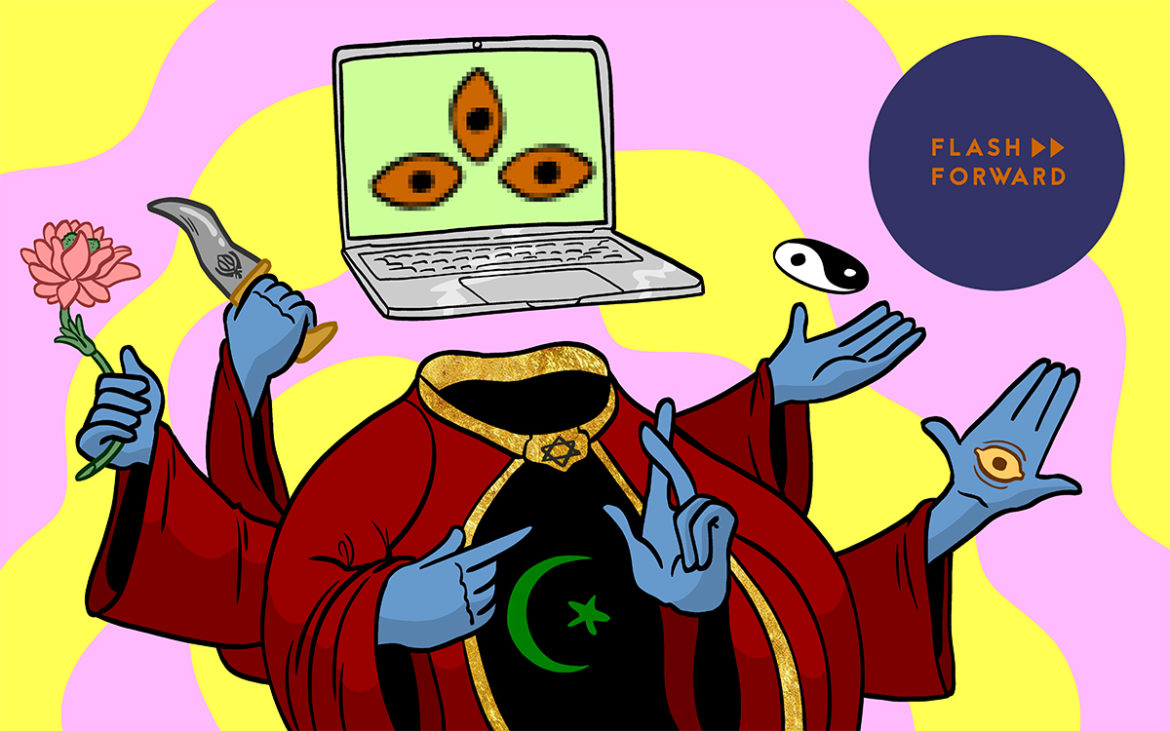

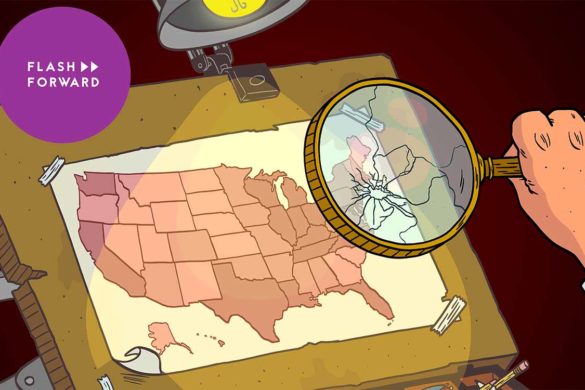

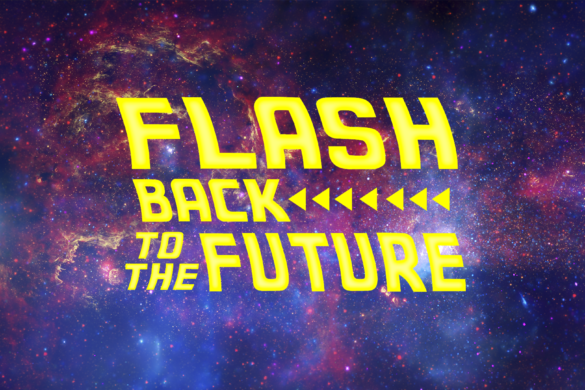

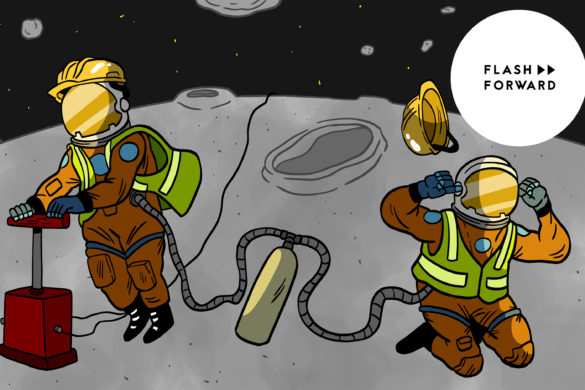

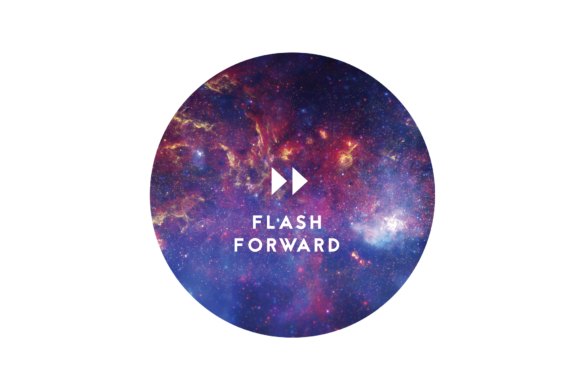
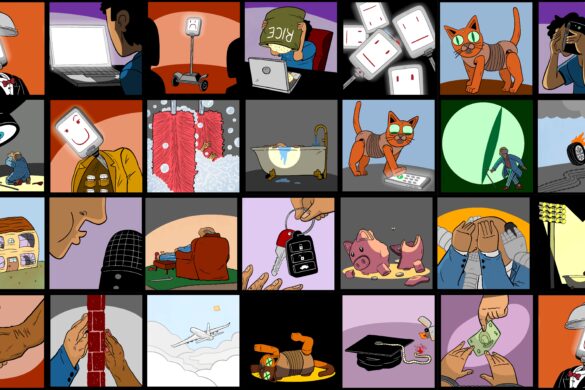

15 comments
Interesting experiment.
Besides your guests succumbing to the temptation to make sense of nonsense, the most notable feature is the degree to which this resembles http://wisdomofchopra.com . I’d be curious as to what Janelle Shane says about the degree of similarity given the vastly more sophisticated machine learning algorithm (s) and much larger database of text.
[…] AI is clearly extending its reach into society. A podcaster named Rose Eveleth helped create an algorithm that wrote an AI bible gathered from sacred writings. It’s a remarkable exercise, even though the […]
[…] AI is clearly extending its reach into society. A podcaster named Rose Eveleth helped create an algorithm that wrote an AI bible gathered from sacred writings. It’s a remarkable exercise, even though the […]
[…] AI is clearly extending its reach into society. A podcaster named Rose Eveleth helped create an algorithm that wrote an AI bible gathered from sacred writings. It’s a remarkable exercise, even though the […]
[…] AI is clearly extending its reach into society. A podcaster named Rose Eveleth helped create an algorithm that wrote an AI bible gathered from sacred writings. It’s a remarkable exercise, even though […]
[…] AI is clearly extending its reach into society. A podcaster named Rose Eveleth helped create an algorithm that wrote an AI bible gathered from sacred writings. It’s a remarkable exercise, even though the […]
[…] AI is clearly extending its reach into society. A podcaster named Rose Eveleth helped create an algorithm that wrote an AI bible gathered from sacred writings. It’s a remarkable exercise, even though the […]
[…] AI is clearly extending its reach into society. A podcaster named Rose Eveleth helped create an algorithm that wrote an AI bible gathered from sacred writings. It’s a remarkable exercise, even though […]
[…] AI is clearly extending its reach into society. A podcaster named Rose Eveleth helped create an algorithm that wrote an AI bible gathered from sacred writings. It’s a remarkable exercise, even though […]
[…] Listen to the Flash Forward podcast to hear more from the holy texts of the Church of Amalgamation. […]
[…] Our Father, Who art in Algorithm Deze aflevering onderzoekt het idee van een machine die alle religieuze teksten ter wereld verwerkt tot één “super religie”. Hoe beslis je welke religies gebruikt worden en hoe ga je om met vertalingen en versies van teksten? En hoe gaat het algoritme om met de interpretaties van bijvoorbeeld de Bijbel? Dit idee heeft de podcast op een simpelere manier daadwerkelijk uitgevoerd, om zo de gevolgen van een dergelijke toekomst te onderzoeken. Daarom moet je de eerste tien minuten luisteren naar een bizarre computerpreek, maar dat moet je even over hebben voor een interessante aflevering. […]
[…] “Our Father, Who Art In Algorithm” (one of Rose’s favorite Flash Forward episodes) […]
[…] recently helped with Rose Eveleth’s podcast Flash Forward, which is a science fiction/technology speculation podcast in which she and her guests talk about a […]
[…] conclusion to come out of these experiments was Elias Mahanna on the Fast Forward podcast who theorized the idea of a religious matchmaking […]
[…] thought it through well enough. One of the ones that I really love is the super religion one about an algorithm that makes a super religion. I really enjoy thinking about what it takes to create a culture or a movement. I collaborated with […]